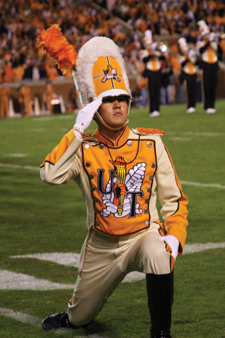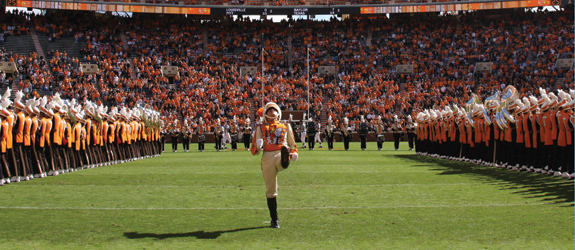Celebrating its 140th year, the “Pride” is a source of exactly that for UT students, alumni, and fans.
My friend Justin’s first visit to Neyland Stadium was in 2007. As the pregame show progressed, the Pride of the Southland Marching Band lined up in front of the designated visitors’ section and began playing “Glory, Glory.” I turned to Justin (a Georgia Bulldogs fan—I somehow tolerate him anyway) and said, “This is the part where our band plays your fight song better than you do.”
He had to concede the point.
History and Tradition
Whether you’re one of the lifelong Volunteer faithful or a rival fan hearing them for the first time, there’s no denying the power of the Pride’s sound. The 300-member band is recognized as one of the most prestigious in the nation, and they have a history and a resume that back up the reputation.
The band was first organized as a corps of cadets in 1869. Its instrumentation was primarily cornets, and it was often headed by a cadet leader. In 1892, the band was reorganized under bandmaster Ernest H. Garratt. Two years later, Ernest Garratt was replaced by Charles P. Garratt. At the turn of the century, William A. Knabe took over leadership of the band, and held the position of bandmaster until his death in 1914. It was during this time that the first recorded appearance of the band at a football game was made: In 1902, the band performed at the home game against Sewanee, in which the Vols won 6–0.
 By 1917, the band had 30 members and was under the leadership of William Crouch. In 1925, Crouch was replaced by Ernest W. Hall. During Hall’s tenure, the band grew to more than 80 members, all male. The 1940s, however, brought considerable change to the band. Walter Ryba was named the new director, and female majorettes began marching with the band. The halftime shows became theme-oriented and included guest artists. It was during this time that Ed Harris, a sports reporter for the Knoxville Journal, dubbed the band the “Pride of the Southland.”
By 1917, the band had 30 members and was under the leadership of William Crouch. In 1925, Crouch was replaced by Ernest W. Hall. During Hall’s tenure, the band grew to more than 80 members, all male. The 1940s, however, brought considerable change to the band. Walter Ryba was named the new director, and female majorettes began marching with the band. The halftime shows became theme-oriented and included guest artists. It was during this time that Ed Harris, a sports reporter for the Knoxville Journal, dubbed the band the “Pride of the Southland.”
With Ryba’s retirement at the end of 1960, a new era in the band’s history began. For the next three decades, the band, under the direction of Dr. W.J. Julian, grew in size, prestige, and reputation—and the change was immediate.
In his first season as director, Julian designed new uniforms for the band—uniforms that have remained a tradition at the University of Tennessee. The band was moved from the university’s military department and placed under music education. By 1964, the band had grown to more than 140 men and women. It also had become known as an innovator with performances like the “Circle Drill.”
Then, in 1972, Julian and the Pride introduced a new song to the fans at Neyland Stadium: “Rocky Top” immediately became the school’s unofficial fight song. Countless other traditions were established under Julian’s leadership, certainly not the least of which is the opening of the “T” for the football team during every pregame ceremony.
In July 1997, the Pride began the current chapter in its history with the naming of its ninth director, Dr. Gary Sousa. Under Sousa’s leadership the band has continued to honor the rich traditions of the University of Tennessee, and has brought a new level of excitement and spirit to Neyland Stadium.
The Pride’s national reputation for excellence is due at least in part to its numerous television appearances. The band has appeared at the Rose Bowl, Cotton Bowl, Sugar Bowl, Orange Bowl, Citrus Bowl, Sun Bowl, Hall of Fame Bowl, and at the 1998 National Championship Fiesta Bowl—more than 40 bowl appearances in all. Also, the Pride of the Southland is the only college band to have appeared in the past 12 consecutive presidential inauguration parades. In 2007, the Pride made headway in cementing its international reputation as well, marching in the St. Patrick’s Day Parade in Dublin, Ireland.
Beyond the Pride of the Southland Marching Band, there are several other components of the band program. The Pep Band program adds to the band’s reach. There are two football pep bands, made up of members of the Pride. The Orange Pep Band performs at pep rallies; the White Pep Band performs for the Vol Walk. Additionally, there are two pep bands during basketball season, the Men’s Basketball Band and the Lady Vols’ Basketball Band. Both pep bands play at their respective home games and travel to SEC and NCAA tournaments. Also, the 15-member Volleyball Pep Band plays for all home matches of the Lady Vol volleyball team.
The UT Concert Bands—the Wind Ensemble and the Symphonic Band—have performed at conferences of the Music Educators National Conference, the College Band Directors National Association, the National Band Association, and the American Bandmasters Association, as well as in major concert halls across the country.
Band Members
Band members past and present will tell you that their experiences in the band at UT have shaped them not merely as musicians but also as people. Commitment, dedication, and hard work are commonalities among band members at UT.
“Successful work is hard work,” says Jeremy Lumpkin (’08), “and hard work requires time. But the time is very well spent. The result of our hard work in the band is consistency and precision, and you can transfer those skills into a lot of other fields.”
Lumpkin played the saxophone in the Pride of the Southland, as well as the wind ensemble, quartet, and jazz band, during his time at UT Knoxville. He is proud of his affiliation with the Pride, and notes the things that set UT’s band apart from peer institutions: “Observe how they practice, and then observe how we practice. Look at what they wear, and look at what we wear—even under our jackets, we wear matching shirts. No one would ever run in their uniform; we respect it too much for that. Some bands take their hats off in the stands; we never take our hats off, because our hats are part of the uniform. Before every game, we stand in the Music Building and sing the alma mater, and as we leave, we all walk under the sign that says ‘I will give my all for the Pride today’ and we hit it.”
“It’s amazing to be part of something bigger than you are,” agrees Amy Merritt (’08), a former baritone player in the band, “something thousands of people before you have been part of, and something you know thousands after will continue. It’s really hard to explain how incredible it is to be part of any group that has upheld such a standard of excellence for such a long time.”
Alumni Band
Alumni’s reverence for their experience in the band is nearly universal, which explains the high level of participation in the Alumni Band program. Among other activities, the Alumni Band performs with the current Pride each year for Homecoming, including participation in the pregame walk to the stadium and “Salute to the Hill,” as well as the Homecoming halftime show. Members of the Alumni Band also comprise pep bands for basketball games scheduled during the university’s winter break.
“As an adult, the band has given me and other alumni the opportunity to give back to the university,” says Bill Burkhart (’77), president of the Alumni Band. “And the band is fun…. What better way to spend one’s time than being part of something life-changing for all involved and glorious at the same time?
“The Pride is not so much about game day as it is about character development,” Burkhart continues, “and that I value.”
Reminiscing about his days as a student in the Pride, Burkhart says membership in the band was “the single defining event or time that most of us had in college. We remember the highs and lows of band camp, the march to
the stadium, pregame and halftime, bowl games, and inaugurations in far greater detail than any class, girlfriend, or other activity.”
Burkhart also says that being part of the band reinforced the defining life lessons and principles his parents had instilled in him: “Our parents gave it to us; the university and the Pride not only demanded it, but enforced it. We are who we are as an organization because of that.”
Giving Back
It’s simple, Burkhart says, to ensure that the Pride of the Southland remains in the upper echelon of college marching bands. “Give back,” he urges fellow UT alumni. “Time, money, emotional support. And represent the university in the only way that reflects well upon it: with integrity and honor.”
Sitting in the stands of Neyland, you may have heard it proclaimed, or you may have said it yourself: “We’ve never lost a halftime.” Thanks to the dedication, poise, and prowess of the members of the Pride of the Southland Marching Band, we never will.

